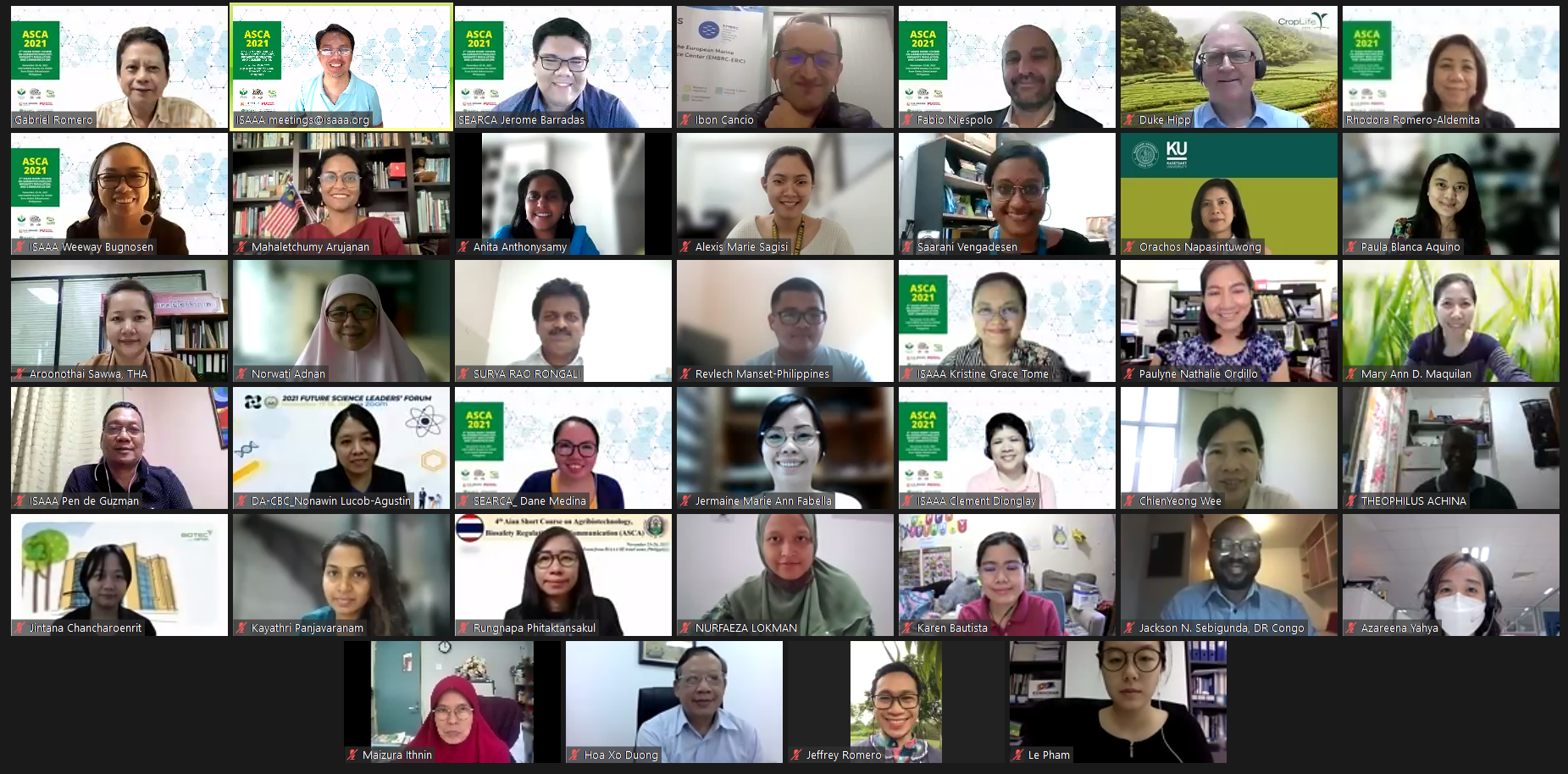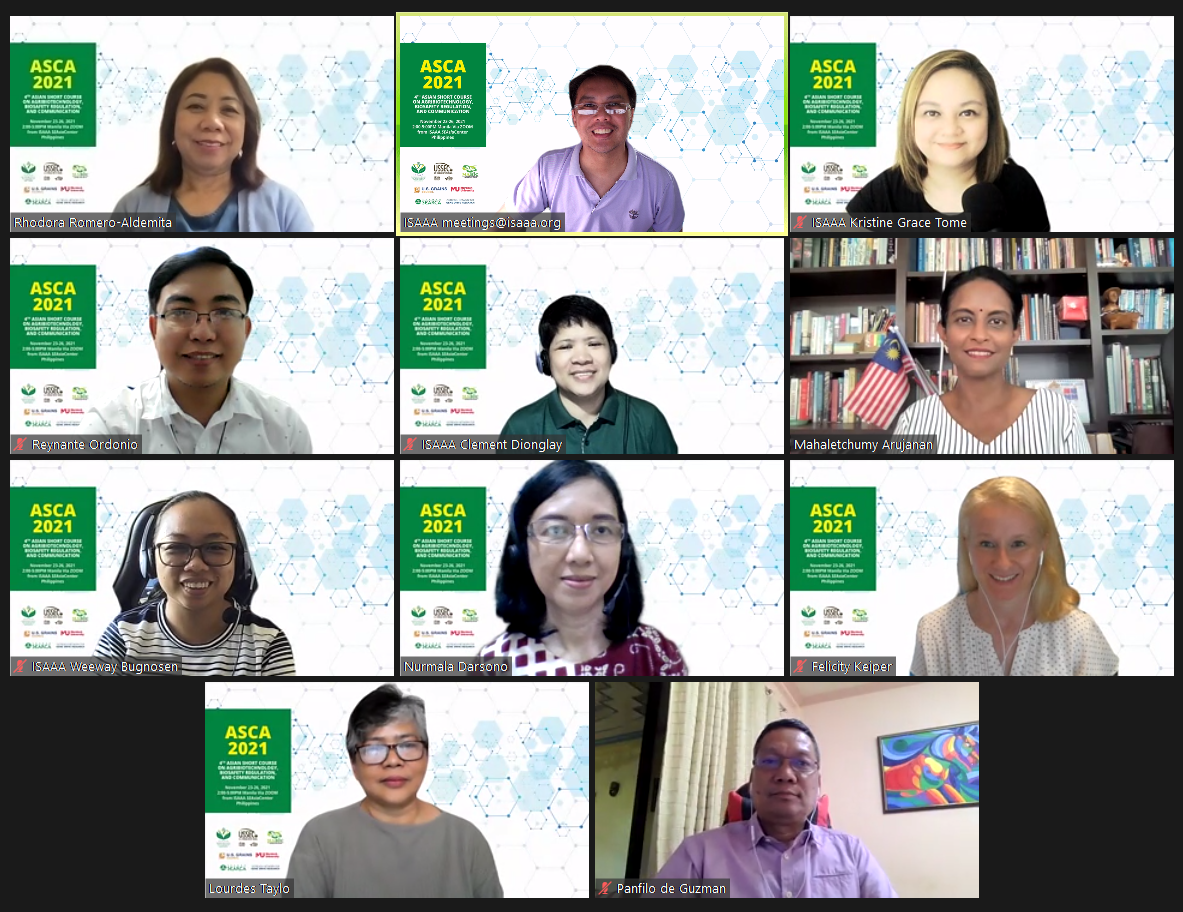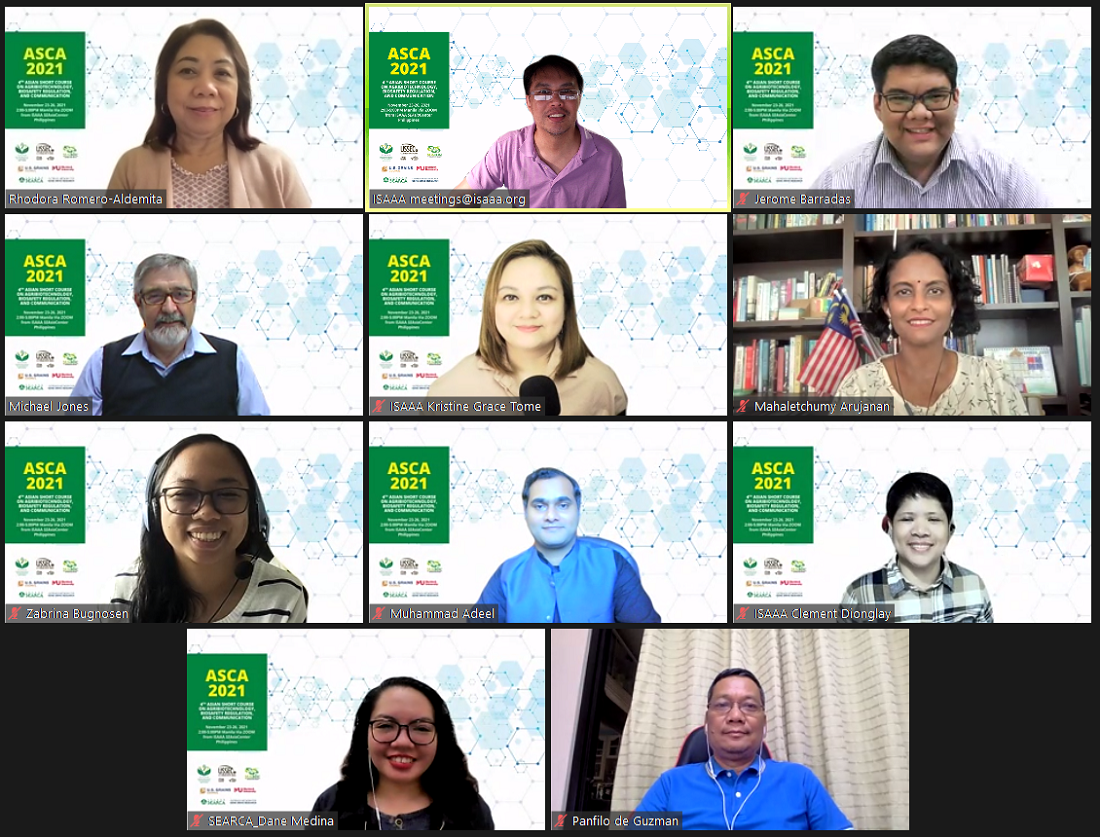ISAAA Continues to Advocate Public Acceptance of Modern Biotech and Science-Based Communication Through ASCA 2021
| |
ISAAA and its partner organizations held the annual Asian Short Course on Agribiotechnology, Biosafety Regulation, and Communication (ASCA) from November 23-26, 2021. The event, which was first held in 2018 in Malaysia, has always served as a platform for representatives of different countries to meet and engage in discussions about the recent developments on the topics of modern biotechnology, particularly genetic modification (GM) and gene editing (GEd), as well as related technologies, local and international regulations, the effects to the economy, transboundary movement of its products, and science communication.

ASCA 2021 accommodated 48 participants from Brazil, China, the Democratic Republic of Congo, Ghana, India, Malaysia, Philippines, Thailand, and Vietnam. The participants were composed of regulators, technology developers and researchers from both the public and private sectors, and members of the academe as either faculty or student. The event was made possible through the combined efforts of ISAAA, the Southeast Asian Regional Center for Graduate Study and Research in Agriculture (SEARCA), Malaysian Biotechnology Information Centre, United States Export Soybean Council, United States Grains Council, Outreach Network for Gene Drive Research, and Murdoch University. Dr. Mahaletchumy Arujanan, ISAAA Global Coordinator. Dr. Rhodora Romero-Aldemita, ISAAA SEAsiaCenter Director, gave the overview of the course. ISAAA and SEARCA personnel served as moderators and rapporteurs throughout the course.
This year’s topics comprised of discussions that dwelled on the different stages of developing a modern biotech product. The research to commercialization stages, the regulations, the collaborations among stakeholders, and finally bringing the product to the intended beneficiaries and making them publicly acceptable were all included in the course’s six sessions. Session 1 provided an overview of the genetic modification and gene editing technologies presented by Dr. Gabriel Romero of the Philippines Seed Industry Association and Dr. Ma. Genaleen Diaz of the University of the Philippines Los Baños (UP Los Baños), respectively. This was followed by a report of the global status of biotech crop and animal technologies and products around the world by Dr. Rhodora Romero-Aldemita and an overview of international gene editing policies by Prof. Martin Lema of the University of Quilmes in Argentina.
Session 2, on the other hand, provided the participants a short briefer of the biotech status in their respective countries. Representatives from the Philippines, Malaysia, Thailand, Democratic Republic of Congo, Ghana, and India were selected to give a short presentation about the current legislation and regulations in their respective countries to guide the development and commercialization of modern biotech crops.

Session 3 was focused on explaining the stages that a GM product goes through from development to commercialization. The session began with the topic of Golden Rice in the Philippines presented by Dr. Reynante Ordonio of the Philippine Rice Research Institute. This was followed by Dr. Lourdes Taylo’s presentation on the Bt Eggplant in the Philippines developed by UP Los Baños. Dr. Nurmalasari Darsono of the Airlangga University in Surabaya, Indonesia then shared her experiences about the development of drought tolerant Sugarcane. These were reinforced by the presentation of Dr. Glenn Gregorio, Director of SEARCA, who explained how the collaboration among the academe, industry, and the government can help deliver modern biotechnology products to their intended beneficiaries.
After being given the chance to understand what it takes to produce modern biotech products, the participants were treated to further talks in Session 4 about what affects the research and development of GM and GEd products. Dr. David Heron, a private consultant and former senior policy advisor of the USDA APHIS, explained how the Cartagena Protocol on Biosafety (CPB) affects domestic biosafety regulatory approaches of a country. Dr. Felicity Keiper, an expert on the global regulatory affairs, seeds, and traits from Melbourne, Australia, then discussed Synthetic Biology – its concept, developments, and how it is defined in the CPB. Dr. Ibon Cancio of the University of Basque Country, located north of Spain, focused on digital sequence imaging and how researchers are able to access, utilize, and share data and benefits of the genetic resources across the globe, including data sequences of protein and DNA found in different organisms. The session was capped off by Dr. Fabio Niespolo of the Outreach Network for Gene Drive Research who spoke about the science and applications of the gene drive technology and how vastly diverse it is. Applications for this technology include mitigation of mosquito-borne diseases and island invasive species management.
The economic and market impacts of modern biotech crops were also talked about during Session 5 which comprised of two presentations. The first one was by Mr. Duke Hipp of CropLife Asia who talked about the economic impacts of biotech regulations based on experiences of different countries in different regions of the world. The second presentation was on the regulatory asynchrony and impact on trade of low-level presence of modern biotech products by Dr. Gabriel Romero.
Session 6 introduced the concepts of science communication and science diplomacy to the participants. Dr. Mahaletchumy Arujanan, ISAAA Global Coordinator, provided the key elements and importance of communicating science and science-based reporting to the public. This was followed by presentations on photography as a language by Mr. Eric John Azucena, storytelling science in Facebook by Ms. Kristine Grace N. Tome, and storytelling in Twitter by Ms. Clement Dionglay. The three are all key persons of ISAAA’s Global Knowledge Center on Crop Biotechnology.

ASCA 2021 introduced its latest feature to the ASCA course which is science diplomacy. Prof. Michael Jones and Mr. Muhammad Adeel of Murdoch University served as resource persons and facilitators for the session. They first gave an introduction of what science diplomacy is, and then proceeded with giving the rules for the biotech game workshop. During the workshop, the participants were divided into 10 groups, each representing a country that will participate in a mock exercise that simulates the discussions that occur during COPMOP meetings in the Convention of Biological Diversity. Each group was provided with a statement on the country’s stand on GM and GEd products. Then a country representative was called to present their stand, which led to negotiations among countries to either further reinforce the statement and country-relationship or otherwise. Through the workshop, the participants were able to experience how delegates of the COP-MOP meetings discuss, develop and amend international biosafety regulations.
The 4-day course ended by asking selected participants to give their impressions, share what they learned, and give suggestions for future events. These were followed by a closing message from Dr. Romero-Aldemita, with an invitation to participate in another ASCA in 2022 through a face-to-face setting provided that the COVID-19 pandemic eases by then.
Related Articles:
- ISAAA Conducts 3rd ASCA for Capacity Enhancement of International Scientists, Regulators, Beneficiaries
- Asian Course Tackles Importance of Integrating Research, Effective Communication, and Science-based Regulation in Agribiotech
| Newer Post | Archive | Older Post |
Science Speaks is ISAAA Inc.'s official blog. Weekly blog articles, authored by ISAAA writers, partners, and invited contributors, aim to help share, disseminate, and promote scientific knowledge and its vital role in achieving global agricultural sustainability and development. Your support to Science Speaks will help us achieve this goal. You can help us by donating as little as $10.

